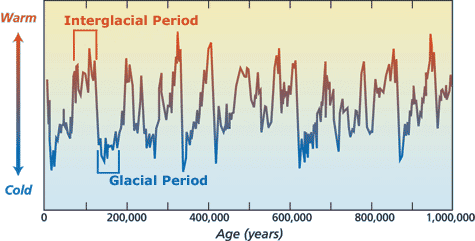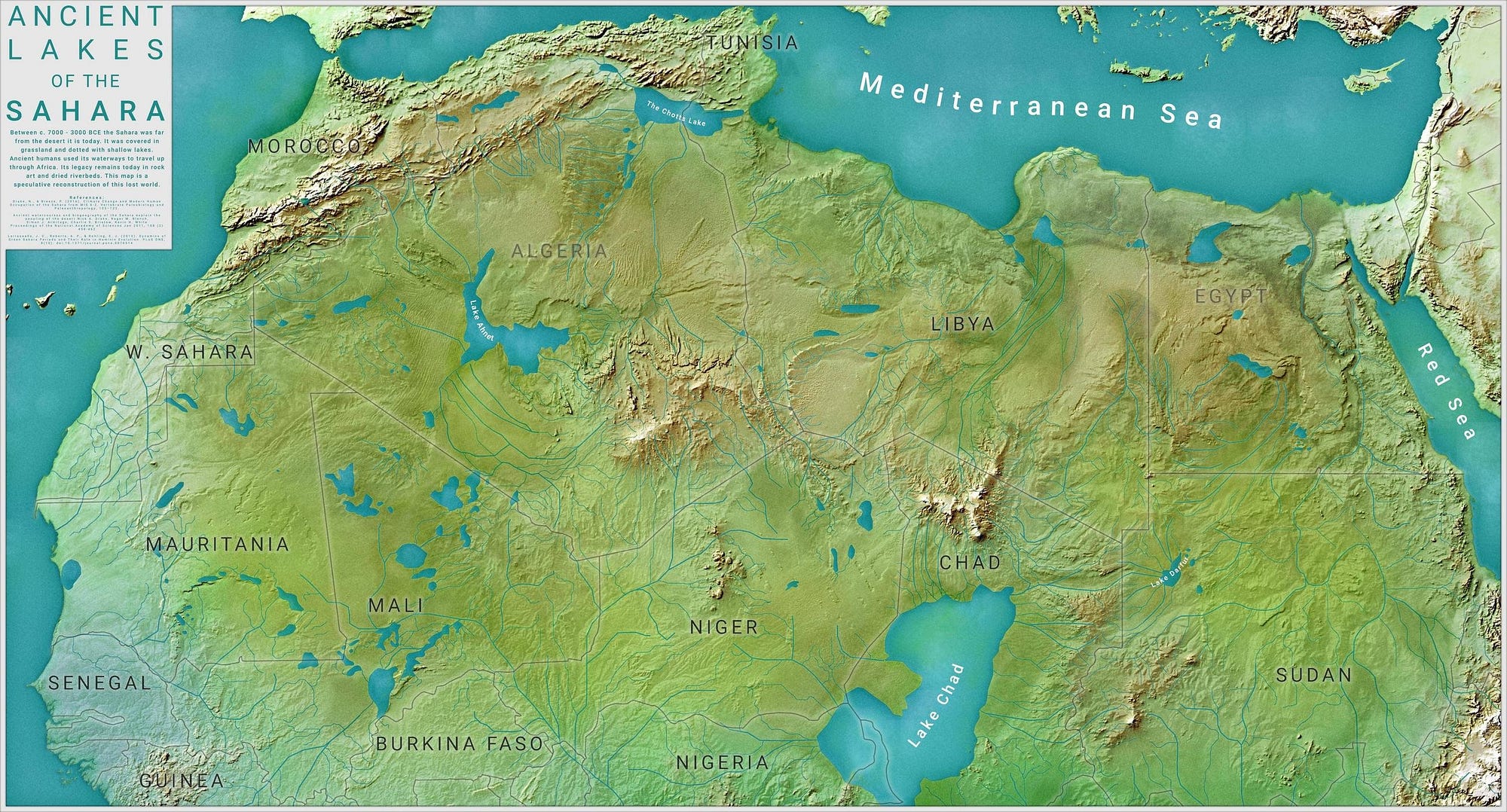"Why do you think Climate should never change?"
A reader sent in this question. I think it could mean a lot of different things based on tone or context. For example, apart from its literal sense, it could also be taken to mean, "Why is (modern) climate change problematic?" or "Why should we worry about (modern) climate change?". Here, I try to address these, one-by-one.
"Why do you think Climate should never change?"
Actually, I don't think that the climate should never change. An inspection of the paleoclimatic record (a record of the climate of the past) readily elicits many, many instances of climate change in the history of our planet. In fact, over sufficiently long timescales, climate change is the norm, not an aberration.
Consider, for example, the "Ice Ages". These are popularly (but incorrectly*) thought to refer to the cold periods of the Quaternary Glaciation. Over the last 1 million years, the climate rhythmically fluctuated between warmer Interglacials and colder Glacials. Thus, cooling or warming of the Earth's climate is really nothing new.
 |
| Source |
Consider something more recent, with a focus on a different aspect of the climate. The largest hot desert in the world 一 the Sahara 一 has routinely taken breaks from its "hyperarid" status. The Green Sahara periods are episodes of intensification of the West African Monsoon, so much so that the entire landscape of the desert would change to a vegetated one. Such drying or "wettening" of a region almost three times the size of India is also a known instance of paleo- climate change, and hence, nothing new.
 |
| An artistic rendering of what the Sahara might have looked like 8,000 years ago Source |
Contrast this with the time period from 1.8 - 0.8 billion years ago (during the Proterozoic). The lack of any major climatic or geological events (discovered so far, at least) earned it the title of "Boring Billion". Further research may dislodge this name, but the point remains 一 that climatic stability is not the norm, and climate change by itself is no cause for surprise or shock.
This is because there are simply too many factors 一 and I'm talking of natural factors here 一 that determine the state of the climate. Many of these are known to change cyclically or predictably, and many are thought to have tipping points that could show large, seemingly one-off, changes. Thus, to put it unequivocally - I'd actually be very surprised if the climate would never change.
This inevitably leads us to the next question..
"Then why is (modern) climate change problematic?"
There are two major aspects to consider here.
First, modern climate change is taking place at an unprecedented rate. Atmospheric CO2 levels are out of the "normal" bounds for the last 8,00,000 years. The best analogue for the modern scenario is considered to be the Pliocene, 3 million years ago. While climate change is the norm in the history of our planet, the rate at which it is now happening isn't.
Secondly, the real problem isn't with climate change but our ability to deal with it. Climate change affects human society in myriad ways. Elevated temperatures push humans and our infrastructure outside our comfort zone. Increased variability in precipitation leads to a lot more extreme events leading to floods and droughts, even at the same place. The weather becomes much less predictable and manageable. The very template of our lives is disturbed.
We know that climate change has affected human societies in the past. While the onset of a Green Sahara Period (there were many) is considered to be the reason humans managed to migrate out of Africa, the termination of another led to the collapse of several African and Arabian settlements. From the fall of the Akkadian Empire to the rise of Ancient Egypt, one thing is obvious: climate change has led to widespread human migration and social restructuring.
We also know that with modern climate change, such drastic upheavals have already started. I invite the reader to go through this article about The Great Climate Migration which describes the "vast remapping of the world's populations". While the focus is on the Americas, similar phenomena are occurring all over the world, including India. Migration is only one symptom of the all-pervasive issue, the impacts of which can be measured in terms of numerous other metrics such as
Finally, with the long-atmospheric life time of the CO2, we know that the effects of modern climate change will continue to be felt for several decades (and in some cases, centuries). Thus, any enthusiastic attempts to adapt or keep-adapting, without addressing the root cause of it all, will prove to be short-sighted. These are some of the reasons why modern climate change alarms even those who are used to studying about climate change of the past.
* Technically, an Ice Age refers to a period when ice was perennially present on the Earth's surface. These are also called Glaciation Events and we know of five major ones throughout the Earth's history. Among these, the latest was is the Quaternary Glaciation - which is ongoing. Yes, we're technically in an Ice Age right now.
In popular usage, "Ice Age" usually refers to the last glacial, or even the glacials, of the current Ice Age; but such usage is incorrect.



Nice Article, appreciate the efforts you put in. Its known that co2 has an impact in climate change, but what about water vapours some research says they too increases temperature by many folds have got a chance to study about them? But haven't read much about them.
ReplyDeleteThanks a lot! You might find this interesting:
Deletehttps://skepticalscience.com/water-vapor-greenhouse-gas.htm
I also write about water vapour here:
https://w7i7.blogspot.com/2020/03/all-ghgs-are-equal-but-co2-is-more.html